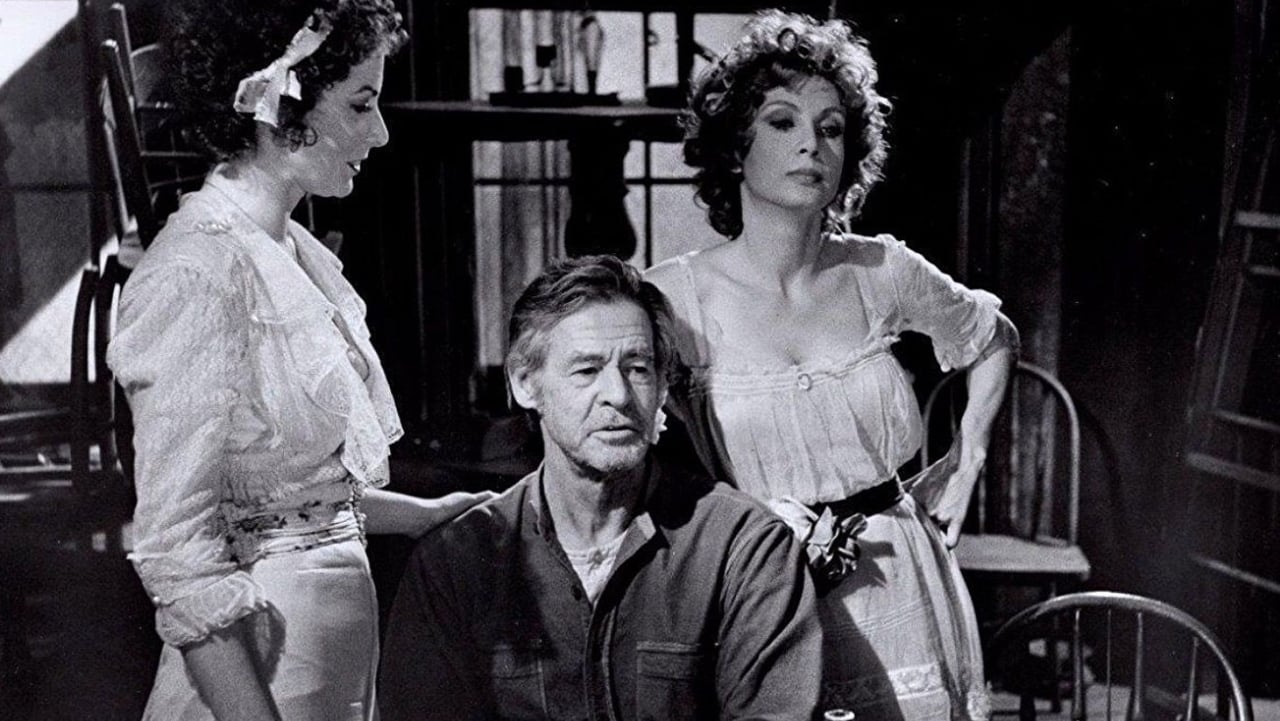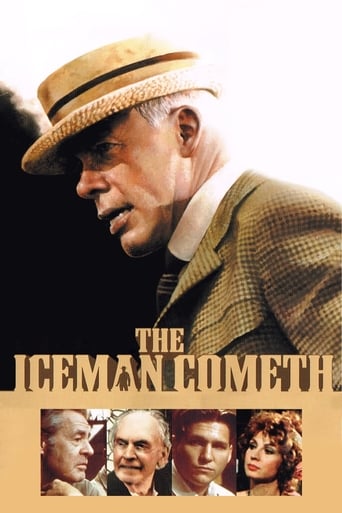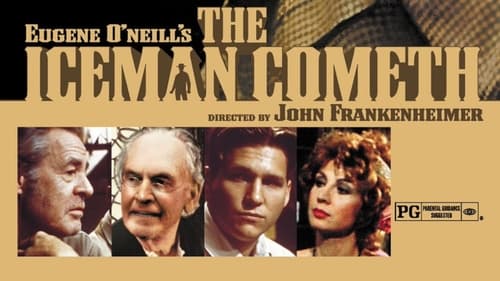


Overrated
... View MoreBest movie ever!
... View MoreEach character in this movie — down to the smallest one — is an individual rather than a type, prone to spontaneous changes of mood and sometimes amusing outbursts of pettiness or ill humor.
... View MoreThe storyline feels a little thin and moth-eaten in parts but this sequel is plenty of fun.
... View MoreWhile I don't cover much of the plot in this long film, I do try to explain the philosophy that underpins why a bunch of drunks are sitting around a bar, in 1912 New York, waiting for their friend, Hickey, to arrive. If you'd rather see the film first, then read no further.*** When I saw this 1973 film in the seventies, I thought it was an interesting, if long-winded, exposition about the evils of alcohol addiction and sloth, and not much else. Being in my early thirties then, y'see, I was more interested in less depressing topics.Recently, however, I obtained a DVD and decided to have another look. When I finished I realized, of course, that the play is indeed much, much more than my first, immature assessment. In fact, as I watched, it became very clear to me that the whole play is an allegory that plays no pun intended - with the biblical John the Baptist, The Last Supper, and the betrayal by Judas Iscariot.Intrigued by those thoughts, I searched the internet for O'Neill biographies (as I knew next to nothing about him) because I had an idea that O'Neill had been a Catholic who'd rebelled and that he had fully intended his play to (almost) parody those religious icons. Various search results confirmed O'Neill's religious background and his rejection of Catholicism while the following, from another online source, supports the idea of a religious underpinning for the play: "The Iceman Cometh, the most complex and perhaps the finest of the O'Neill tragedies, followed in 1939, although it did not appear on Broadway until 1946. Laced with subtle religious symbolism, the play is a study of man's need to cling to his hope for a better life, even if he must delude himself to do so." So, yes, the play is about a lot of drunken loafers in various stages of despair, but they all represent the status of humanity, according to O'Neill: besotted by its own self-delusion and self-pity.Consider Hickey (Lee Marvin, in a truly great performance) as a modern rendition of the biblical John: the quintessential salesman, the sharp-talking shark who can tear you to pieces verbally, and the man who has the message that will save you; yes, you twelve, you drunken bums, sitting on your asses twenty-four-seven, drowning yourselves in your collective delusions. Forget your pipe-dreams, says Hickey, stand up for yourselves, on your own feet, and get out there and face the world, the new world that is dawning for each, if only you would act! But first, you must give up the first, and maybe worst, crutch: booze. Because, continues Hickey, I've seen the light and I've given up drinking ah, well, except for the odd, important and festive occasion, y'know...So what could be more important than a birthday party for Harry Hope (Frederic March), the bar owner without hope, who hasn't stepped outside since his wife died twenty years earlier? He and the other eleven men in that bar have been waiting and waiting for Hickey to come and lavish his eloquence (and drinking money, of course) upon them all.So, Hickey delivers, and then some, by convincing them all, except Larry Slade (Robert Ryan in his best-ever performance), in a moving - literally and figuratively - tirade during and after that Last Supper that Hickey will ever attend at this bar. Why last? Because Hickey has an unsavory secret that shocks them all, (except Larry) to the core when he is forced to reveal it and, in doing so, they all (except Larry again) reject Hickey's promise of personal salvation. Hence, when Hickey meets his fate with the law, as did the biblical John, and the bums go back to their booze and their delusions, Larry is the only one to realize that he can no longer remain on "the grandstand of philosophical detachment" and must act now according to his convictions.Ironically, Larry's decision seals the fate of Don Paritt (a very young Jeff Bridges), a thoroughly unlikable coward and betrayer of lost causes. Lacking true courage to initiate the action to atone for his crime, Don beseeches Larry to decide for him, with the inevitable result. And, as Larry savors his new found "freedom", such as it is, he looks through the window, and specifically away from his one-time drinking partners who are all now busily, once again, deluding themselves with drink.As the epitome of a modernity that rejects religion, Lee Marvin says it all, with consummate skill and panache; only Robert Ryan's Larry (O'Neill's alter ego), perhaps as a counterpoint to the biblical Peter, sees Hickey's message for what it truly is a rejection of that "opium of the masses" as Karl Marx opined - and finally decides to act for himself. The other ten 'apostles' at the bar are lost souls because it's sufficient for O'Neill, in my opinion, that Larry finally woke up; the rest of the world can live in Hell.What's missing or, rather, who's missing from this whole play is, of course, a Christ-figure. Again, given O'Neill's view of religion as a delusion, that is entirely fitting.The setting all in one long, dark and moody bar the directing from Frankenheimer, the photography that uses long takes and medium closeups throughout, the production standards, all add up to an experience that is only rarely presented. And, without a doubt, all of the actors performed to the peak, I think, of their prowess.Highly recommended for all theatre and cinema buffs.I must now, of course, search for a DVD of the 1960 version and prepare a comparative review.
... View MoreAll round wonderful record of the play. Beautifully directed by Frankenheimer. Excellent all round cast with top kudos to Frederick March. As to Lee Marvin. He comes alive in the long monologue after foot dragging through the part till then. The ultimate Hickey? The one that can't be touched or beat? My main man Jason. Rent the 1960 TV version directed by Lumet. There you will see greatness. If only Robards played it in the 1973 version, how much deeper it would have become. How ironic that because he didn't get a chance to do the part and ended up in a horrific car accident he nevertheless came back to Broadway in A Moon for the Misbegotten, and once again wiped everyone off the stage with another confessional monologue, the likes of which we will never see again.
... View More"The Iceman Cometh" was part of American Film Theatre, an experiment by producer Ely Landau. The idea was for top-flight casts and creative talent to film classic plays. Then selected theaters would show one film a month, but only on two days (consecutive Tuesdays, if memory serves) before returning to their regular programs until the following month, when the next AFT release would be put up for two more days.The program was nothing if not high-tone and ambitious. Productions included Edward Albee's "A Delicate Balance" with Katharine Hepburn, Paul Scofield and Lee Remick; "Lost in the Stars," the Maxwell Anderson-Kurt Weill musical based on "Cry, the Beloved Country"; Eugene Ionesco's "Rhinoceros" with Zero Mostel and Gene Wilder; and Chekhov's "The Three Sisters" directed by Laurence Olivier. Unfortunately, the project as a whole was an unmitigated disaster. For one thing, most of the films were uninspired, some were mediocre, and a few were downright awful. But most of all, the whole idea flew in the face of motion picture economics: how could any movie (or live play, for that matter) possibly break even when it ran for only TWO DAYS? All things considered, it's a tribute to Landau's skill as a promoter that the AFT managed to limp through two "seasons," 1973-74 and 1974-75, before collapsing in a tangled heap of debts, lawsuits, and countersuits. But collapse it did, and the legal can-of-worms that it left, with the AFT's liabilities mixed with the rights of authors and their estates, is probably what keeps the films out of theatrical circulation and unavailable on video.In the case of most AFT productions, truth be told, that's no great loss. But "The Iceman Cometh" is head-and-shoulders above all the rest put together (I suspect Landau knew it, too: that's no doubt why he put his best foot forward by making it the premiere production). It is, in fact, a great movie -- a great play with a once-in-a-lifetime cast (it was Fredric March's last movie, and Robert Ryan died even before it came out) under the hand of a fine director (John Frankenheimer) who cut his teeth on live drama during the Golden Age of Television.Nobody connected with this film ever did better work -- not Ryan, who was brilliant and deserved a posthumous Oscar nomination for it; not March, one of Hollywood's greatest; none of the supporting cast; not even Jeff Bridges, who was only 23 and just at the beginning of his career (he once said that this was the film that made him realize he was serious about being an actor).A special case is Lee Marvin in the pivotal role of Hickey; he was much disparaged by critics at the time, but the tone was one ofhow-dare-this-B-movie-thug-lay-his-unclean-hands-on-a-role-that-belongs-now- and-forever-to-Jason-Robards. Meaning no disrespect, but Robards was hardly infallible; Lee Marvin never did anything as bad as Robards's Brutus in "Julius Caesar" (1970). An impartial viewing of Marvin in "The Iceman Cometh" shows he was entirely up to the role, even in the demanding, shattering 25-minute monologue where Hickey's self-loathing hypocrisy slips out against his will. I was lucky enough to see this film twice in a theater -- once on its premiere in November '73, and again in the spring of '75, when Landau tried (in vain) to recoup his losses by giving a general release to selected AFT films. I've never forgotten it, and there are moments as fresh in my mind as if I saw them yesterday: Robert Ryan's anguish when he snarls, "You think you'll get me to admit that to myself?" and Marvin replies, "But you just did admit it, didn't you?"; Jeff Bridges's tormented profile as he sits at the table with Ryan trying to sort out his life; Fredric March as the doddering saloon-keeper venturing outside for the first time in years; Lee Marvin's ironic little dance as he calls himself "a happy-go-lucky slob like me." All, and so much more, unforgettable.I am dismayed to read in another comment here that there seems to be a three-hour version of this film out there somewhere. This would be outrageous enough if the original version were readily available, but since the original is not, it's intolerable. Any cutting of this film (which already judiciously edits O'Neill's original text) can only be a mutilation. Accept no substitutes, and DO NOT watch this film, regardless of its length, if it is shown on TV with commercial breaks. See it ONLY in its 239-minute version, uninterrupted except for the two intermissions O'Neill intended (this was, by the way, the first movie with two intermissions) -- the cumulative power of the play demands it, and a movie this great deserves nothing less.
... View MoreIn 1973 when the American Film Institute's repertoire played in selected U.S. city theaters, "The Iceman Cometh" was a series standout. The film retains its effectiveness today, due to O'Neill's insightful script, John Frankenheimer's excellent direction, and a fine cast, headed by Fredric March and Robert Ryan. We are fortunate to have so beautiful a production of this classic American play preserved on film.
... View More